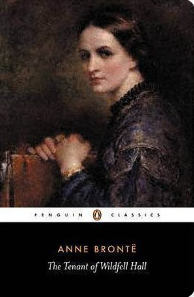
“You would have us encourage our sons to prove all things by their own experience, while our daughters must not even profit by the experience of others.”
View all my reviews
The Tenant of Wildfell Hall by Anne Brontë
My rating: 4 of 5 stars
My daughter and I read this together as a “book project”- we are catching up on the books we’ve been meaning to read. I liked it more than I expected. It is considered one of the first feminist books, a “book of ideas” I can see that. It is a bit melodramatic, although perhaps not as much as the works of her sisters, such as Jane Eyre and Wuthering Heights. It does give an interesting perspective on well-to-do English gentlemen who do not have any purpose but to drink, hunt, and gamble!
This is, at heart, a romance novel. The tropes that Bronte uses serve the story, because, as my daughter says it is a ‘romance with a purpose’. The two prominent tropes are the “secret identity” and “enemies to lovers” which then develop into “forbidden/star-crossed lovers”.
Let’s look more closely. Gilbert Markham recounts a story from his past in a letter to a dear friend, Mr. Halford. Years before, a new, mysterious, and private neighbor moved into Wildfell Hall. Many rumors were told about why she would live alone with her son, in such a home!
Shas had two or three rooms made habitable; and there she lives all alone- She is called Mrs. Graham, and she is in mourning- not widow’s weeds, but slightish mourning- and she is quite young…thry tried all they could to find out who she was and where she came from… Moreover, she was barely civil to them…”
As the villagers get to know her, they include her in their gatherings, but she is always standoffish. Gilbert begins to have feelings for her, but this only brings about the jealousy of his former love interest, Eliza who, though “charming beyond description, coquettish, without affectation” seemed frivolous compared to Mrs. Graham. This jealousy leads to terrible rumors about Mrs. Graham. She decides to leave, but gives Markham her journal regarding her “situation”.
And herein lies the real purpose of the book. Mrs. Graham is really Mrs. Helen Huntingdon. She is not a widow; rather she has left her idle, abusive, and alcoholic husband. She is hiding with her son in her brother’s abandoned estate and is supporting herself by selling her paintings.
The message for women was that it was possible to overcome the limitations of the time. Helen Huntingdon diligently fulfilled her duties as a wife and mother. She cared for her husband and son and was pious and forgiving. The catalyst for her finally leaving was the need to protect her son. By providing insight into her circumstances the author allows readers to empathize with her predicament and understand her reasons for leaving. This resulted in her achieving some degree of domestic stability and creative freedom. This was a radical idea!
If you would have your son to walk honorably through the world, you must not attempt to clear the stones from his path, but teach him to walk firmly over them – not insist upon leading him by the hand, but let him learn to go alone.”
Of course, she dutifully returned to nurse Arthur as he lay dying, but this provided readers with even more admiration for her. And for lovers of romance novels, there was a “happily ever after”.
Victorian critics found the novel “shocking”, “revolting”, “brutal” and “coarse even for men”, The critic Edwin Percy Ripple wrote that the author, “Acton Bell” (Bronte’s pen name), was “a witness to the wolfish side of human nature”.
“[The Tenant] seems a convincing proof, that there is nothing kindly in [this]author’s powerful mind, and that, if he continues to write novels, he will introduce into the land of romance a larger number of hateful men and women than any other author of the day”.
Edwin Percy Ripple, North American Review
After Anne’s death, her sister Charlotte would not allow it to be reprinted. She found the topic of the novel to be “unfortunately chosen”, and at odds with Anne’s nature.
it had faults of execution, faults of art, was obvious, but faults of intention of feeling could be suspected by none who knew the writer. For my part, I consider the subject unfortunately chosen – it was one the author was not qualified to handle at once vigorously and truthfully. The simple and natural – quiet description and simple pathos – are, I think Acton Bell’s forte. I liked Agnes Grey better than the present work.”
Charlotte Brontee, in a letter to W.S. Williams
Luckily for us, it has regained popularity in recent decades. On 5 November 2019, the BBC News listed The Tenant of Wildfell Hall on its list of the 100 most influential novels. To read it for free, follow this link to Project Gutenberg, and listen for free here.
